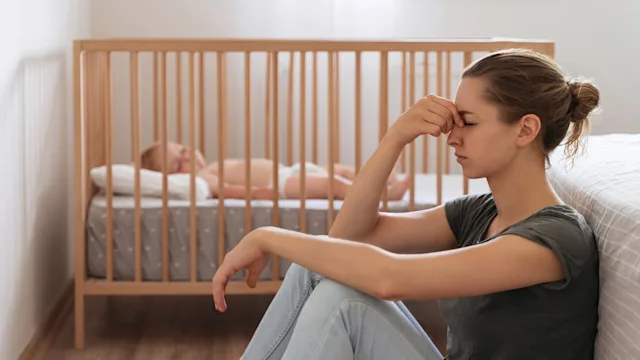Key takeaways:
Postpartum depression (PPD) is a condition that can affect any parent before or after the birth of a new baby. It doesn’t only affect women and mothers — men and fathers can have it too.
Symptoms of male PPD include lack of interest, difficulty bonding with the child, changes in sleep and appetite, and difficulty concentrating. And symptoms may not start until several months after birth.
PPD is more likely to affect younger fathers, those experiencing financial stress, and people with a partner who has PPD.
Save on related medications
Any new parent can tell you that the arrival of a new baby comes with many challenges. And for many people, this time of adjustment also brings new symptoms of depression and anxiety. People and their providers are getting better at recognizing the signs of postpartum depression (PPD).
Even though awareness about this condition is increasing, many people still only associate it with women and mothers. But men, fathers, and partners of those who gave birth can experience it, too. In fact, estimates show that 4% to 25% of new fathers have paternal postpartum depression. We’ll go over how you can tell you the difference between the normal adjustment to parenthood and PPD.
Quiz: Do I have postpartum depression?
What is postpartum depression?
Postpartum depression is a type of depression that develops around the time of childbirth. There’s no strict definition of what qualifies as PPD. It used to be defined as depression that develops in the first month after having a baby.
But experts now recognize that the symptoms of PPD often develop during pregnancy — before the child is even born. And PPD doesn’t only affect mothers. It can affect fathers and adoptive parents, too. And a father’s symptoms in particular might not set in until months later.
This is why providers and specialists now favor the term “peripartum depression.” It allows for a broader definition — “post” means “after,” whereas “peri” means “around.”
PPD feels different than the expected stress and fatigue that comes with a new baby. It affects someone’s daily mood, sleeping and eating habits, and ability to care for themselves and their baby. People with PPD often find themselves in unfamiliar territory of feeling sad, hopeless, or worrying excessively about things. This all can have a big effect on their relationships with their partner and their ability to bond with their baby.
Is there a difference between PPD and depression?
The main difference between PPD and depression is timing. PPD is depression that is diagnosed during pregnancy or immediately after childbirth. PPD and depression have the same symptoms — like sadness, loss of interest, and feelings of hopelessness.
But PPD can also cause difficult feelings toward the baby. Many parents with PPD have thoughts of harming their baby or feelings of guilt that they’re a bad parent.
What causes postpartum depression in men?
Hormonal changes are often assumed to be the main cause of postpartum depression in women who give birth. While hormones do play a role, they’re not the only explanation — since fathers can also develop depression after having a baby.
Having a baby causes significant lifestyle changes that can contribute to depression, including:
Sleep deprivation
Greater financial stress
Changes in the relationship with your partner
Greater sense of responsibility
Less free time to spend with your support system or on hobbies
Certain risk factors or experiences can also increase the chances of a father developing PPD, including:
Low levels of certain hormones like testosterone, estrogen, cortisol, oxytocin, and prolactin
Lack of support from friends and family
Difficulty bonding with the infant
Not feeling part of mother/infant bonding
A partner who is experiencing postpartum depression
For men, the greatest risk factor for developing PPD is having a partner with PPD. Fathers are 2.5 times more likely to develop depression if their partners are also living with depression. Fortunately, several different forms of help are available for men who develop PPD.
Is there a difference between female and male postpartum depression?
There are some small differences in the way PPD shows up in men, fathers, or partners. Women and people who give birth often experience the symptoms during pregnancy or right after childbirth. Their partners are at higher risk for PPD a little later, and their symptoms may not develop until several months after birth.
It also seems that the risk factors are slightly different. Anyone with a history of depression is at increased risk for PPD. But unique risk factors for fathers might be younger age or financial stress.
What are the symptoms of postpartum depression in men?
A diagnosis of postpartum depression technically requires that someone’s symptoms of depression begin within 1 month of having a baby. But many mental health professionals find that depression for men and women can actually begin at any point within the first year of a baby’s life. Fathers are also at highest risk for depression when their children are between 3 and 6 months old.
Signs of PPD include:
Feeling sad or irritable for several days of the week
Losing interest in hobbies, activities, or other things that you enjoyed before
Having an increase or decrease in appetite and/or weight
Having trouble falling or staying asleep, or sleeping too much
Feeling tired even if after you sleep a lot
Feeling restless or on edge
Having trouble thinking, concentrating, or making decisions
Feeling guilty or worthless
Having thoughts of self-harm or suicide
If you’re a new father and experience at least 5 of the signs of depression within a 2-week period, you may have PPD.
If you’re feeling suicidal, it’s important to get help right away by either going to your nearest hospital, contacting 911, or calling the National Suicide Prevention Lifeline at 1-800-273-TALK (8255).
How do you treat male postpartum depression?
If you’re experiencing postpartum depression, there are different ways that you can approach getting help. Therapy, medication, and support groups are some of the most common ways to treat this condition. You may choose between one, both, or all of these options.
Counseling and therapy
Psychotherapy, or counseling, is an effective form of treatment for men with PPD. Depending on your preference and how PPD has affected the family, treatment may involve individual, couples, or family therapy.
Individual therapy
This involves a one-on-one meeting with a therapist to talk about your struggles and work toward solutions. Traditional therapies for depression can be helpful for fathers dealing with PPD.
These include cognitive behavioral therapy (CBT), which focuses on changing and replacing unhealthy thoughts and behaviors. There’s also psychodynamic therapy, which involves understanding how unconscious thoughts and feelings from the past may be affecting you today.
In addition to traditional therapy, fathers with PPD may also benefit from information and education on parenting. This can help increase your confidence in parenting skills.
Couples therapy
Couples therapy may be helpful for families when the father feels depressed. You can do this type of therapy alone or along with individual therapy. During couples therapy, both partners have an opportunity to learn about PPD, develop skills to help support one another, and improve communication.
This type of therapy is especially important when both partners are experiencing PPD.
Family therapy
During family therapy, several or all family members (including children), participate in treatment. This type of therapy helps family members address recurring issues in their relationships, develop better communication skills, and improve the home environment. Family therapy can be helpful with children who are old enough to attend elementary school and are aware of problems within the family.
Medication
Medication is another form of treatment for men, fathers, and partners with PPD. Healthcare providers often recommend medication when someone is experiencing severe depression or suicidal ideation — or when the depression seems to be getting worse over time.
If you’ve tried therapy alone and it does not seem to be helping, then consider speaking with a provider about taking medication. Many people find that medication and therapy together are most effective for treating depression.
Different types of antidepressants can treat depression:
Selective serotonin reuptake inhibitors (SSRIs) are one of the most common types of antidepressants prescribed for depression in adults. They work by preventing the reabsorption of serotonin, which increases levels of this chemical in the brain. Higher levels of serotonin in the brain can help reduce depression and anxiety. But too little serotonin can cause depression. Common SSRIs include sertraline (Zoloft), fluoxetine (Prozac), and escitalopram (Lexapro).
Serotonin and norepinephrine reuptake inhibitors (SNRIs) are like SSRIs in that they also prevent the reabsorption of serotonin as well as norepinephrine in the brain. These medications include duloxetine (Cymbalta) and venlafaxine (Effexor).
Tricyclic antidepressants (TCAs) are an older type of antidepressant that alter levels of serotonin, norepinephrine, and acetylcholine in the brain. These medications include clomipramine (Anafranil) and desipramine (Norpramin).
Monoamine oxidase inhibitors (MAOIs) are another older type of antidepressant that work by inhibiting the monoamine oxidase enzyme from breaking down monoamines. This allows for more neurotransmitters to be present in the brain. Examples of MAOIs include tranylcypromine (Parnate) and phenelzine (Nardil).
If you’re considering medication for PPD, you can seek a consultation with a psychiatrist, psychiatric nurse practitioner, or another medical professional who has experience treating depression with prescription medications.
Support groups
Support groups are another way to help fathers cope with the stress of parenting. They allow men to learn about postpartum depression, share their experiences with one another, and give and receive advice and support.
Postpartum Support International is an organization that provides information and resources for parents who may be experiencing postpartum depression or other parenting struggles. A postpartum expert leads a monthly phone group for fathers. Dads can talk openly with one another and receive advice and support from both a professional and peers.
PostpartumDads is another organization that offers guidance, stories, and an online Facebook group for fathers.
Some men may feel uncomfortable attending a support group with strangers. Forming your own unofficial “dad group” with friends and family who are also fathers is another option. You can set aside a regular day and time to meet, either with or without your children. You can discuss fatherhood, work, relationships, or other things. Even those who do not have PPD can benefit from a regular commitment to connect with other fathers.
When to seek help for male postpartum depression
If you’re concerned that you or someone in your family has symptoms of PPD, you’re not alone. Reach out to someone you trust to ask for help. This can be as simple as talking to your partner, a friend, or a fellow parent. Or you can talk to any provider for guidance on the next best steps.
This is important, even if your symptoms feel mild. Many people dismiss difficult feelings as a normal part of parenthood. But it’s never too late — or too early — to ask for help. The right support and treatment can help you feel better and make it easier to care for yourself and your family.
The bottom line
Postpartum depression affects both women and men. Certain factors and circumstances, like having a partner with postpartum depression or a lack of support, can increase the chances that a father develops PPD.
Fortunately, there are treatments available for this condition, including different types of therapy, medications, and support groups. Getting help for PPD is important because leaving it untreated can negatively affect your own mental health, partner, and children.

Why trust our experts?


References
988 Suicide and Crisis Lifeline. (n.d.). 988 Suicide and Crisis Lifeline.
American Psychiatric Association. (2020). What is peripartum depression (formerly postpartum)?.
InformedHealth.org. (2020). Depression: How effective are antidepressants?. Institute for Quality and Efficiency in Health Care.
Kim, P., et al. (2007). Sad dads: Paternal postpartum depression. Psychiatry.
Letourneau, N. L., et al. (2012). Postpartum depression is a family affair: Addressing the impact on mothers, fathers, and children. Issues in Mental Health Nursing.
Musser, A. K., et al. (2012). Paternal postpartum depression: What health care providers should know. Journal of Pediatric Health Care.
Postpartum Support International. (n.d.). Help for dads.
Postpartum Support International. (n.d.). Postpartum Support International.
PostpartumDads. (n.d.). PostpartumDads.










